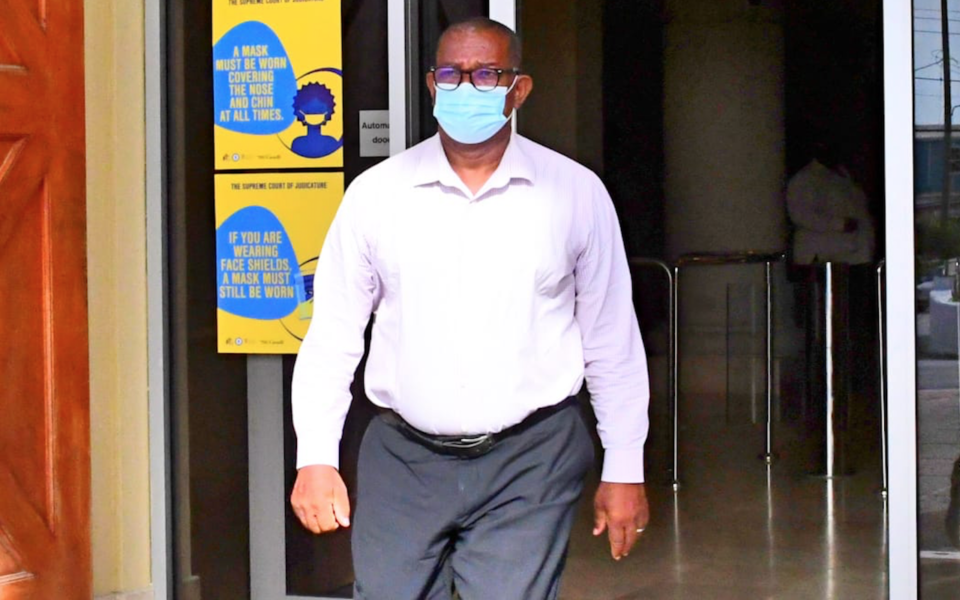Caribbean Court of Justice Grants Alex Tasker Special Leave to Challenge Extradition in Money Laundering Case

December 8, 2023
The Caribbean Court of Justice (CCJ) has granted former insurance executive Alex Tasker special leave to challenge his extradition to the US over money laundering charges. The CCJ ruled that the matter will be sent back to the Barbados Court of Appeal for further consideration.
The Caribbean Court of Justice (CCJ) has tossed former insurance executive Alex Tasker a lifeline in his bid to avoid extradition to the United States over his alleged involvement in the Donville Inniss money laundering scheme.
The Trinidad-based court on Thursday granted Tasker special leave to challenge his extradition to the United States on charges of money laundering and conspiracy to launder money in a case in which Inniss, a former minister in the Freundel Stuart administration, was convicted in a US court.
The five-member panel of CCJ judges reopened its previous decision to refuse special permission to appeal and gave the green light to Tasker’s second bid to challenge extradition.
The CCJ, Barbados’ final appeal court, ruled that the matter will have to be sent back to the Barbados Court of Appeal for that court to exercise its own discretion and to determine afresh, the best way to deal with Tasker’s attempt to challenge a magistrate’s extradition order.
The CCJ traced the history of the case before outlining how it came to its latest decision.
The regional tribunal, headed by Justice Adrian Saunders, recalled that in September 2021, the former senior vice president for business development and marketing with the Insurance Corporation of Barbados (ICBL) was committed by a magistrate to surrender to US federal authorities to face money laundering charges there. Immediately after the committal, the magistrate, under Section 19 of the Extradition Act, advised Tasker on how he could challenge the decision and the time limit for doing so, the justices noted.
They said the accused made a challenge under the wrong law, and it was not until after the time limit had expired, that he filed the correct application.
But the Court of Appeal dismissed his application because it was filed late. It also held that it had no jurisdiction to hear Tasker’s application for leave to appeal because it lacked the power to consider whether time should be extended, or whether an appeal filed under the wrong law but within time should carry any weight.
The CCJ noted that the alleged money launderer then approached the CCJ seeking special permission to appeal these decisions of the Court of Appeal.
In July, relying on the papers filed but without holding an oral hearing, the CCJ refused Tasker special permission to appeal the Court of Appeal’s decision, effectively ending his efforts to challenge the extradition order.
But he applied to the CCJ to reopen the case, asking the justices to reconsider their decision because he had not been given an oral hearing as he had expected and therefore had not made full submissions.
The application to re-open the case along with the application for special leave to appeal were heard in Barbados by the CCJ on October 16, during the regional court’s rounds of territorial sittings.
The justices declared: “The CCJ unanimously agreed with Mr Tasker’s attorneys that it was not made clear beforehand that the Court could and would proceed without an oral hearing. The CCJ therefore proceeded to give Mr Tasker an oral hearing of his application. Having heard both parties, the Court then decided that the Court of Appeal erred in concluding that it had no power to decide for itself whether to hear the application for leave to appeal.”
They also ruled that “it was open to the Court of Appeal, notwithstanding the late filing of the prescribed form, to determine whether this was a case in which the Court of Appeal should give effect to the right to a fair trial and facilitate access to justice”.
“Strict compliance with time limits, which must be upheld by courts, nonetheless, is subject to the constitutional right to a fair trial and a court does possess an exceptional jurisdiction to extend statutory time limits in those circumstances where strict compliance would operate to deprive a litigant of his right to a fair trial including his right to appeal,” according to Thursday’s ruling.
Justice Saunders was joined by Justices Winston Anderson, Maureen Rajnauth-Lee, Denys Barrow and Andrew Burgess in the ruling.
Senior counsellors Douglas Mendes and Andrew Pilgrim were joined by Clay Hackett in representing Tasker. Alliston Seale, Deputy Director of Public Prosecutions and Senior State Counsel Oliver Thomas appeared for the State.
[email protected]


